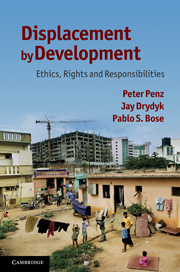Book contents
- Frontmatter
- Contents
- List of tables
- Acknowledgements
- 1 Introduction
- PART I FUNDAMENTALS
- PART II FROM COST–BENEFIT ANALYSIS TO ETHICS
- PART III FROM VALUES TO RESPONSIBILITIES
- 7 Ethical outcomes
- 8 Ethical procedures
- 9 From rights to responsibilities
- 10 International responsibilities and rights regarding displacement
- PART IV REALIZING RESPONSIBILITIES
- Bibliography
- Index
- References
7 - Ethical outcomes
Published online by Cambridge University Press: 05 June 2012
- Frontmatter
- Contents
- List of tables
- Acknowledgements
- 1 Introduction
- PART I FUNDAMENTALS
- PART II FROM COST–BENEFIT ANALYSIS TO ETHICS
- PART III FROM VALUES TO RESPONSIBILITIES
- 7 Ethical outcomes
- 8 Ethical procedures
- 9 From rights to responsibilities
- 10 International responsibilities and rights regarding displacement
- PART IV REALIZING RESPONSIBILITIES
- Bibliography
- Index
- References
Summary
On the four major issues of victimization, benefit-sharing, decision-making and conditions for forcing displacement, there is apparently irresolvable disagreement on three. There may be agreement on one question of outcomes, namely, that it is wrong for oustees as well as the communities receiving them to be victimized by displacement or resettlement. However, there is no settled agreement on whether and how oustees ought to benefit from the development process. Nor is there agreement about what means must be held by people affected by displacement to affect development decision-making, not just for resettlement, but for the project requiring it. Disagreement also remains on the question of conditions for forced displacement: is the only limitation that forced displacement should be necessary for development (i.e. not gratuitous), or may displacement be forced only as a last resort, to avoid affirmative harm to the public interest?
Our aim in this chapter and the next is to show what bearing the seven values framing development ethics may have on these issues. As we have cautioned from the start, these values must be conceived broadly rather than precisely. Hence, they frame debate within development ethics rather than settling it, leaving debate open, for instance, on the meaning and measure of well-being, on the nature of equity and the demands of justice, and so on. The conclusions we draw from these values, therefore, are open in the same ways to further debate.
- Type
- Chapter
- Information
- Displacement by DevelopmentEthics, Rights and Responsibilities, pp. 157 - 186Publisher: Cambridge University PressPrint publication year: 2011

